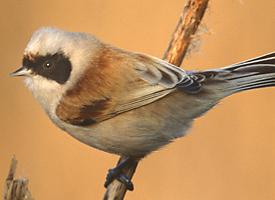
Weights and measures
| Length | 11 cm |
|---|---|
| Weight | 9 kg |
| Wingspan | from 16 to 17,5 cm |
State of endangerment
| Endangered |
Animal description
The Eurasian Penduline Tit (Remiz pendulinus) is a small, captivating bird that belongs to the family Remizidae. This species is particularly noted for its distinctive nesting habits and charming appearance. It is widely distributed across Europe and Asia, inhabiting a range of environments including riverine forests, marshes, and reed beds. The bird's range extends from Western Europe through to Central Asia, making it a common sight across diverse landscapes.One of the most striking features of the Eurasian Penduline Tit is its size and plumage. It is a small bird, measuring about 10-12 cm in length and weighing between 7-9 grams. The plumage is predominantly a soft blend of brown and white. The male boasts a distinctive black mask around its eyes, which contrasts sharply with its white cheeks and underparts. The back and wings are a mixture of gray and brown, allowing it to blend seamlessly into its surroundings. Females and juveniles have a more subdued coloration, lacking the striking black mask of the males but retaining the overall pattern that provides excellent camouflage in their reed bed habitats.
The bird's name, "penduline," refers to its remarkable nesting habits. The Eurasian Penduline Tit is renowned for constructing elaborate, pendulous nests that hang from the branches of trees. These nests are masterpieces of avian architecture, woven from plant fibers, down, and spider silk. The entrance, located at the top, leads into a cozy chamber that is lined with soft materials to keep the eggs and chicks warm. This unique nesting strategy not only provides protection from predators but also from the elements.
Eurasian Penduline Tits are omnivorous, with a diet that includes insects, small invertebrates, and seeds. During the breeding season, their diet is primarily insectivorous, catering to the high protein needs of their chicks. In the winter, they shift to a diet more heavily reliant on seeds, which are more abundant during these months.
The breeding season for the Eurasian Penduline Tit begins in late April or early May. The male plays a significant role in nest construction, which is an essential part of the courtship display to attract a mate. Interestingly, males are known to construct multiple nests, leaving the female to choose her preferred nest. Once the pair has mated, the female lays between 5 to 8 eggs, which she incubates alone. The chicks are altricial, meaning they are born blind and featherless, completely dependent on their mother for food and warmth.
One of the fascinating aspects of Eurasian Penduline Tit behavior is their migratory patterns. Birds from the northern parts of their range tend to migrate southwards for the winter, seeking warmer climates, while those from more temperate regions may remain year-round if food sources are adequate.
The Eurasian Penduline Tit plays a significant role in its ecosystem, contributing to insect control and the dispersal of plant seeds. Despite facing threats from habitat loss and degradation, particularly in wetland areas, the species remains widespread and is listed as Least Concern by the International Union for Conservation of Nature (IUCN). Conservation efforts aimed at preserving their natural habitats are crucial for ensuring the continued survival and prosperity of this remarkable bird species.
New photos of animals
Top 10 animals
- Dolphin gull (Leucophaeus scoresbii)
- Diana monkey (Cercopithecus diana)
- Moustached guenon (Cercopithecus cephus)
- Galápagos tortoise (Geochelone nigra complex)
- Japanese macaque (Macaca fuscata)
- Stone loach (Barbatula barbatula)
- Greek tortoise (Testudo graeca)
- Russian tortoise (Testudo horsfieldii)
- Common flying dragon (Draco volans)
- Galápagos penguin (Spheniscus mendiculus)